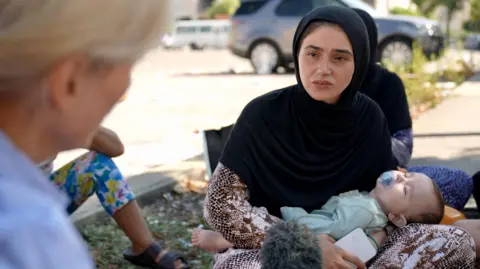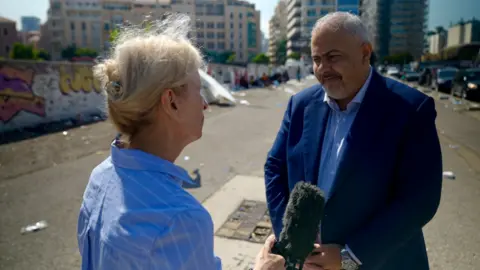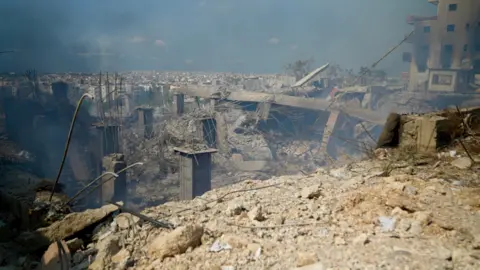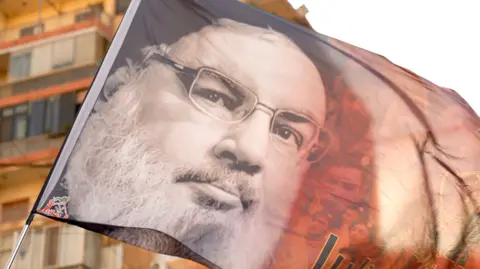[ad_1]
 Goktay Koraltan / BBC
Goktay Koraltan / BBCLebanon is a country that knows war all too well. And it is not eager for more.
It still bears the scars of 15 years of civil war between 1975 and 1990, and of the last war between Hezbollah and Israel in 2006.
But for some, including Beirut’s Governor Marwan Abboud, Israel’s recent escalation already feels worse.
In the past 10 days, the country has endured mass casualties from exploding pagers and walkie-talkies, a wave of assassinations of Hezbollah military commanders, devastating air strikes – and the use of bunker-busting bombs in Beirut, which killed Hezbollah leader Hassan Nasrallah on Friday.
 Goktay Koraltan / BBC
Goktay Koraltan / BBC“It’s the worst moment that the country passed through,” said Abboud, who has no connection with Hezbollah.
“I feel sad. I am shocked by the large number of civilian casualties. I am also shocked by the silence of the international community – as if what’s happening here does not mean anything.”
We spoke at the edge of Beirut’s Martyrs Square, where many families slept in the open last night after fleeing Israel’s strikes in the southern suburb of Dahieh – Hezbollah’s heartland.
They remain in the square today – unsure where to turn for safety, like many in Lebanon.
Asked what he thought Israel’s plan was, the governor replied: “I don’t know but Israel wants to kill and to kill and to kill. May god protect this country.”
His parting words were bleak. “It’s the saddest day of my life,” he said, his voice heavy with emotion.
 Goktay Koraltan / BBC
Goktay Koraltan / BBCA few steps away we met an extended family, sitting on bare concrete, under the harsh morning sun.
Madina Mustafa Ali was rocking her seven-month-old baby Amir in her lap and reliving the trauma of Friday night.
“There was an explosion, and we got scared, especially for the children. So we ran away and came here. This is where we slept,” she said.
She told me the family will stay in the square for now because they have nowhere else to go.
Others are fleeing, some heading to the north of Lebanon. The south of the country is not an option – it’s being hit hard.
 Goktay Koraltan / BBC
Goktay Koraltan / BBCDriving through the city we saw families on the move, some crammed into cars with thin mattresses strapped to the roof, others piled onto motorbikes.
Here and there, we saw people on foot carrying a few belongings.
This is the new landscape of Beirut: boarded-up shops, fewer people, and more fear – especially since Nasrallah’s killing was confirmed.
Throughout the day, plumes of dark smoke billowed from Dahieh. The Hezbollah stronghold looked much weakened today – the two busiest streets were largely deserted, and many apartment blocks looked empty.
We spotted Hezbollah members, guarding an air strike location, one brandishing a Kalashnikov. A sign of tension, or desperation – as normally the armed group doesn’t show its weapons on the streets.
Hezbollah was not watching our every move today – they were more focused perhaps on the threat from above.
We, too, were keeping an eye on the skies, where there were drones.
At the location of one Israeli strike, we saw smoke still rising from the ruins of what appeared to be a factory. We were told it made kitchen roll, and there was plenty of that shredded on the ground.
Lebanon has been rendered a war zone, but there are risks growing for the entire Middle East. And plenty of questions.
Will Hezbollah hit back hard at Israel? Can it?
Will its Iranian backers intervene? Until now they have been in no rush.
And will Tehran’s other regional proxies – in Iraq, Syria and Yemen – get more involved?
[ad_2]

